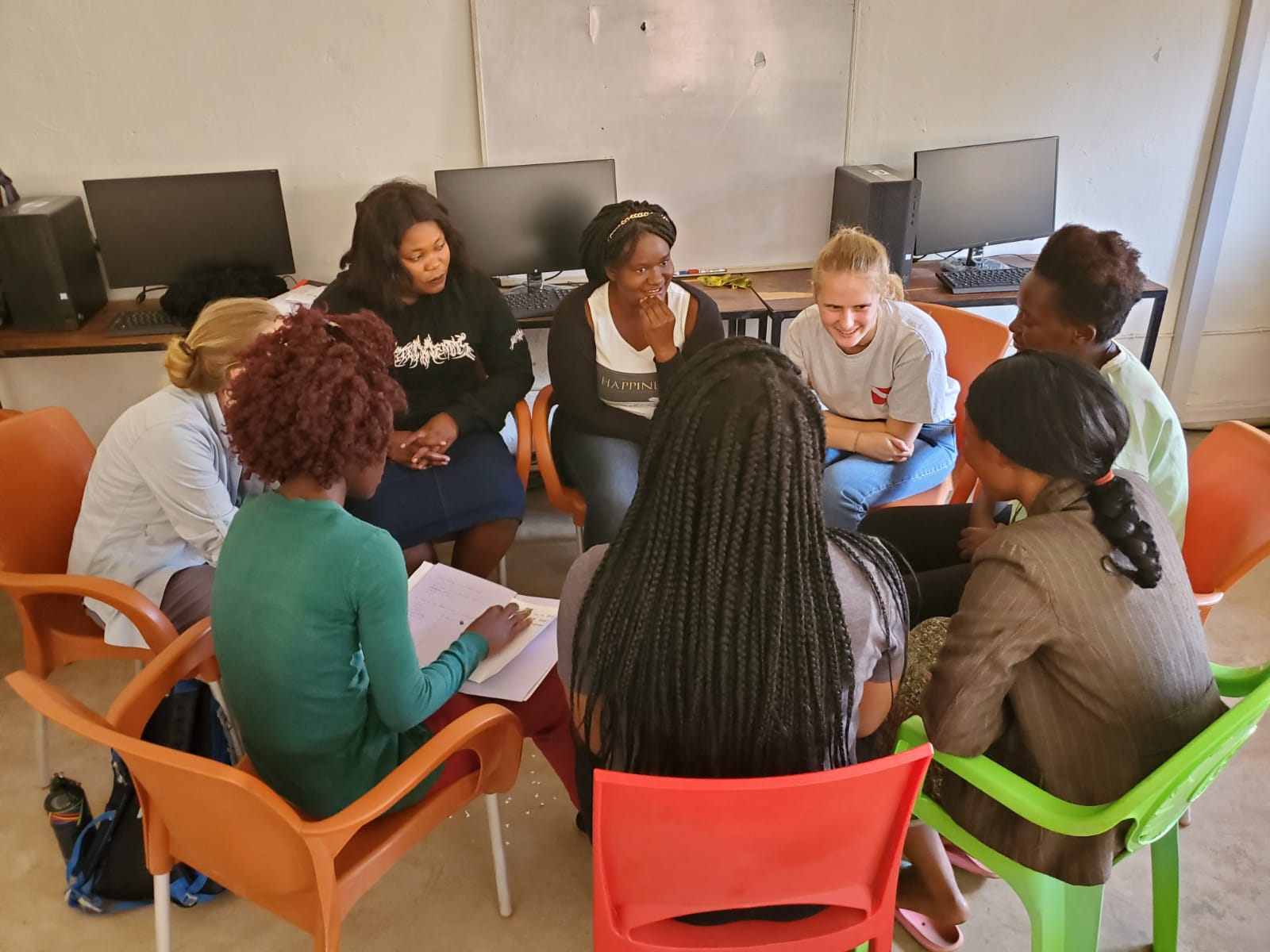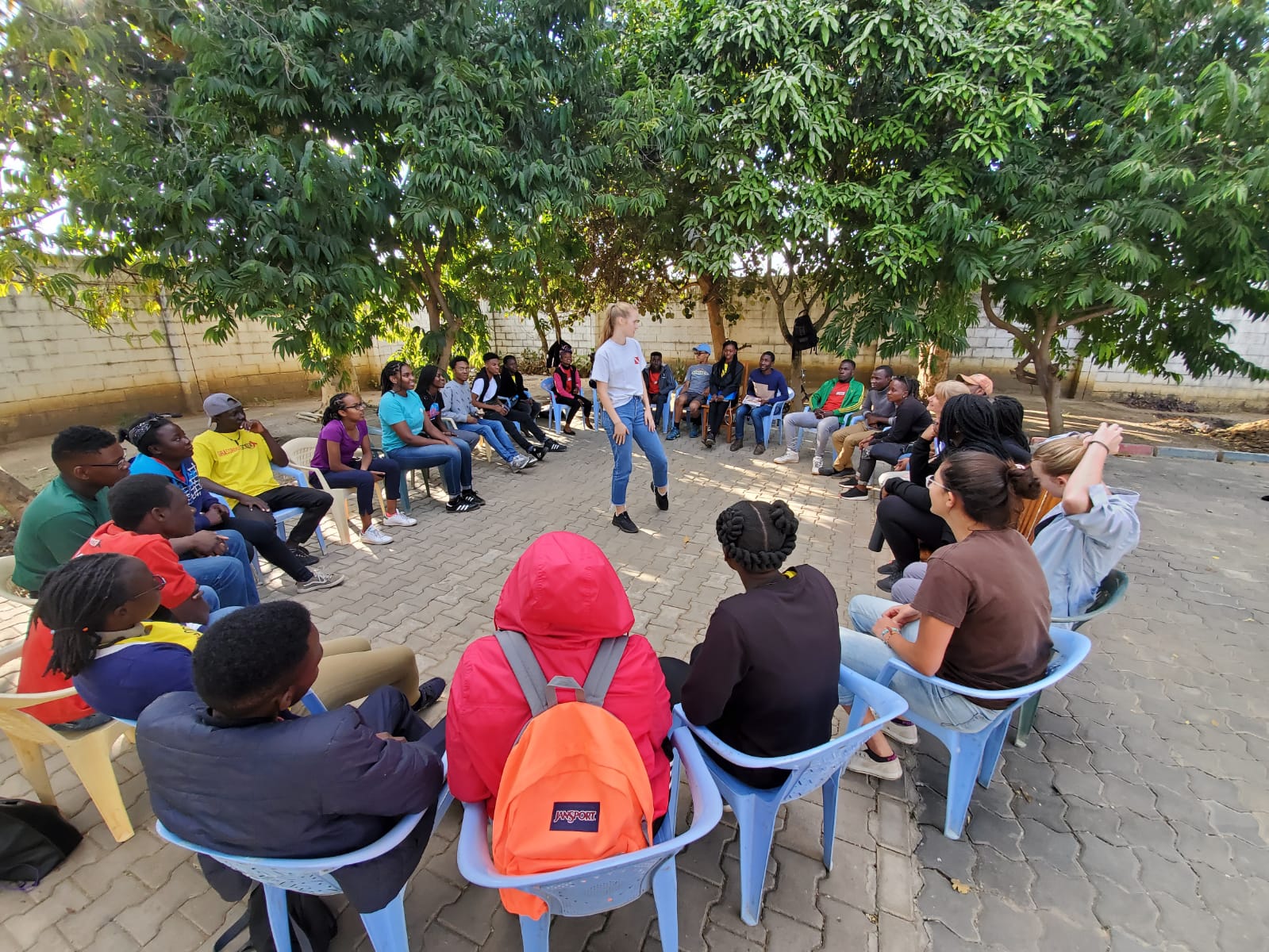
Our second day at Chikumbuso was spent continuing our conversations with gap-year students from the day before. Activities included brainstorming gender stereotypes with the entire group, sorting different sexual acts by level of intimacy for women and men as well as Zambia and the US, and finally having discussions in groups divided by gender focusing on condom usage and questions.
In the morning, the coed discussions were not as productive as we would have hoped. Unfortunately, the boys heavily dominated the dialogue. During the discussion, two girls in the program sitting on either side of me whispered to me, expressing their ongoing frustration with the boys’ hypocrisy regarding their expectations of women. Their comments were insightful, but it was clear they did not feel confident speaking up because of the tone and dynamic of the general discussion.
Despite my frustration and disappointment with the discussion earlier in the day, when we divided the groups by gender, the girls opened up. The single-sex discussions created a safe space for the girls, and although they were initially quiet during this discussion, by the end the girls felt comfortable enough to share some of the customs often hidden from the public in Zambia. For example, they shared a tradition with us that involves forcing girls and young women to go through very specific painful rites of passage that are unfamiliar to us as Americans. These rites of passage are much more prevalent in rural areas than in cities like Lusaka although they do still occur occasionally. When the girls described this custom, rather than seeming emotional, they were blunt and even laughing at the expressions on our faces. This response shocked me because the traditions expected women to sacrifice their health for the sake of upholding beauty standards and social norms, mostly for the purpose of pleasing men. But we also had a long discussion about how deeply ingrained these customs are in Zambia.

Controversial traditions and rituals are found all over the world including the United States. In the US, beauty standards can be extremely strict leading many women to physically modify their bodies, often through such things as plastic surgery or dieting, which can sometimes lead to life-threatening eating disorders. We realized, however, that these American standards are a choice rather than being forced upon young girls like they are in Zambia. In the end, although still frustrated, I understand how difficult it can be to change such deeply ingrained traditions and customs, despite the fact that women’s equality is gaining more awareness and support. I hope the conversation we had with the girls helps them to question the purpose or efficacy of these old customs and whether they want to pass them along to their own daughters.
When the activities with the gap year students finished, the students and older women of Chikumbuso shared songs, poetry, and dances to express their appreciation for our visit, illustrating their immense hospitality, kindness, and community as we all danced and sung together.

After we left, we began a tour of the Ngombe compound around Chikumbuso. The realization I had earlier stuck with me during the tour of the compound. The Ngombe community surrounding Chikumbuso is extensive but lacks formal infrastructure in much of the area. As our tour guide and vice principal of Chikumbuso, Andrew, led us around the community, I was able to further understand the daily lives of Chikumbuso students who all live in Ngombe. Winding dirt paths were full of people coming home from work and children playing. As we traveled through one of the main markets of Ngombe, Andrew described to me how the government was slowly tackling infrastructure challenges throughout impoverished neighborhoods in Lusaka like Ngombe. One challenge he mentioned was that Ngombe is on a slope and the dirt roads in Ngombe often turn to mud during the rainy season, causing mud to pile up in lower areas making communication and transportation difficult. Challenges like these give me further perspective for why the girls at Ngombe may have been less willing to speak up as maybe they feel challenges at home are more urgent.
After we left, we began a tour of the Ngombe compound around Chikumbuso. The realization I had earlier stuck with me during the tour of the compound. The Ngombe community surrounding Chikumbuso is extensive but lacks formal infrastructure in much of the area. As our tour guide and vice principal of Chikumbuso, Andrew, led us around the community, I was able to further understand the daily lives of Chikumbuso students who all live in Ngombe. Winding dirt paths were full of people coming home from work and children playing. As we traveled through one of the main markets of Ngombe, Andrew described to me how the government was slowly tackling infrastructure challenges throughout impoverished neighborhoods in Lusaka like Ngombe. One challenge he mentioned was that Ngombe is on a slope and the dirt roads in Ngombe often turn to mud during the rainy season, causing mud to pile up in lower areas making communication and transportation difficult. Challenges like these give me further perspective for why the girls at Ngombe may have been less willing to speak up as maybe they feel challenges at home are more urgent.
Although expectations differ in type and severity around the world for women, women are expected to fulfill many responsibilities, whether related to work, children, or personal conduct, often in silence and without complaint. The girls I spoke with at Chikumbuso do want fairer treatment and more opportunities but making progress towards these goals is complicated. My experiences in the Ngombe compound and with the young women in the gap year program at Chikumbuso showed me how navigating and being sensitive to tradition is an important part of the culture even if, personally, it seems antithetical to attaining equal rights for women.
Sarah A., National Cathedral School
